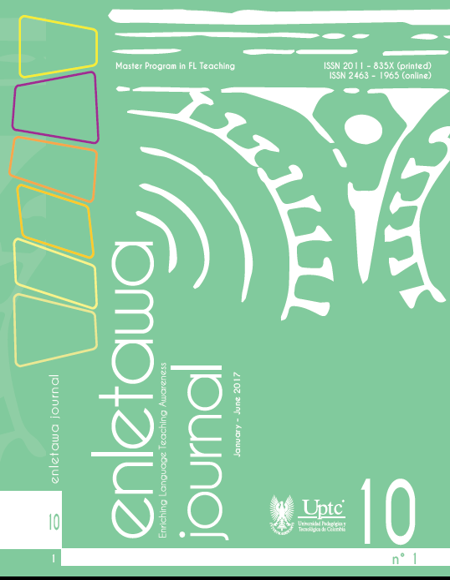Using Mobile Learning to Enhance Pre-Service Teachers’ Participation in Distance Education English Tutoring Sessions

Abstract
This article is the result of a small-scale research study aimed to enhance pre-service teachers’ participation in distance education tutoring sessions at the Universidad Santo Tomas, CAU (University Assistance Centre) in Chiquinquirá. The study was carried out by implementing mobile learning, specifically a mobile learning application called Kahoot. When carrying out online activities, in particular grammar games and oral discussions that involved the use of smart phones in tutorial sessions, the pre- service students were more engaged, and their participation increased greatly. Moreover, it is meaningful for students to improve their English language competence by activating their use of digital skills. Some of the benefits of mobile learning are flexibility and personalized learning activities, which try to address the needs of individual learners. This study showed that mobile learning promotes active participation, as well as knowledge construction and collaborative learning. It also creates a positive atmosphere and exposes students to innovative learning environments.
Keywords
Mobile Learning, Distance Education, Pre-service teachers
References
Abdullah, M., Abu, B. N., and Haizan, M. (2012). Student’s participation in classroom: What motivates them to speak up? Procedia, Social and Behavioral Sciences, 51, 516-522. Retrieved from https://www.researchgate.net/publication/ 257716731_Student’s_Participation_in_ClassroomWhat_Motivates_them_to_Speak_up.
Barr, J. (2016). Developing a positiveclassroom climate. IDEA, pp. 1- 3.
Burns, A. (2003). Collaborative action research for language teachers. USA: Cambridge University Press.
Davis, B. (2009). Tools for teaching. San Francisco: Jossey-Bass.
Fung, Y. and Carr, R. (2000). Face-to-face tutorials in distance learning system: Meeting student needs. Open Learning,15(1), 35–46.
Herrera, L., Cruz, M., and Sandoval, M.(2014). Using personal portable learning tools in the English class. HOW, A Colombian Journal for Teachers of English, 21(2), 74-93.
Johnson, A. (2002). What every teacher should know about action research. Boston, MA: Pearson Education, Inc.
Karmila, I., Goodwin, R., and Mooney, C. (2015). Teachers and mobile learning perception: towards a conceptual model of mobile learning for training. Procedia, social and behavioural sciences, 176,
425-430. Retrieved from https://www. sciencedirect.com/science/article/pii/S1877042815 005297
Kimchi, J., Polivka, B., and Stevenson, J. (1991). Triangulation: Operational definitions. Nursing Research, 40(6), 364-366.
Kimmerle, J., Moskaliuk J., Oeberst, A., and Cress, U. (2015). Learning and collective knowledge construction with social media: A process-oriented perspective. EducPsychol, 50(2), 120–137.
Kukulska-Hulme, A. and Traxler, J. (2005). Mobile Learning: A handbook for educators and trainers. London and New York: Routledge.
Lin, L. (2015). Investigating Chinese HE EFL classrooms: Using collaborative learning to enhance learning. Berlin Heidelberg: Springer.
Loraine. B., Hughes, C., and Tight, M. (2005). Cómo se hace una investigación. (n.p): Fondo Editorial Gedisa.
Mishra, S. (2007). Mobile Learning: A handbook for educators and trainers. Indira Gandhi National Open University. Retrieved from: http://www.irrodl.org/index.php/irrodl/article/view/437/877
Moore, M. and Kearsley, G. (2011). Distance Education: A Systems View of Online Learning. Cengage Learning. Retrieved from: https://books.google.com.co/books?id=dU8KAAAAQBAJ& printsec=frontcover&hl=es&-source=gbs_ge_summary_r&cad=0#v=oneage&q&f= false
Pineda-Hoyos, J. (2014). Social networking sites in the classroom: Unveiling new roles for teachers and new approaches to online course design. Íkala, Revista de Lenguaje y Cultura, 19(3), 269-283.
Riveros, M. R. (2009). Interaction in online tutoring sessions: An opportunity to knit English language learning in a blended program. Profile, 11, 117 -134.
Soykan, E., and Uzunboylu, H. (2015). The view of published articles on mobile learning area in EBSCO database. Procedia - Social and Behavioral Sciences, 710 – 717.